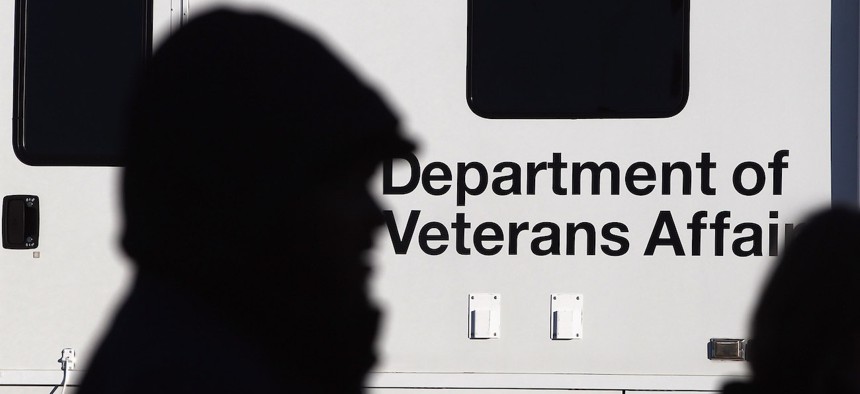
The measure was introduced in the House by Rep. Mike Bost, R-Ill., and in the Senate by Sen. Jerry Moran, R-Kan., who serve as chairman and ranking member of their respective VA committees, and with the support of Sen. Joe Manchin, D-W.Va. John Moore/Getty Images
Republican leaders take another shot at easing the firing process for VA workers
Previous efforts to speed up firing at VA have fallen flat, but lawmakers are launching a new, bipartisan effort.
After a series of setbacks in court and various oversight entities rendered a marquee civil service reform at the Veterans Affairs Department largely unenforceable, key lawmakers are renewing a bipartisan push to once again make it easier to fire employees at the agency.
The Restore VA Accountability Act (H.R. 4278) would allow the department’s secretary to remove or demote any employees and, for supervisors, eliminate their ability to launch an appeal to the Merit Systems Protection Board, the independent agency designed to hear such cases. The measure, introduced in the House by Rep. Mike Bost, R-Ill., and in the Senate by Sen. Jerry Moran, R-Kan., who serve as chairman and ranking member of their respective VA committees, and with the support of Sen. Joe Manchin, D-W.Va., would seek to put into statute provisions that would better protect the bill from the constitutional and other pitfalls that ended enforcement of similar reforms in the past.
VA Secretary Denis McDonough ended the implementation of disciplinary provisions included in the 2017 VA Accountability and Whistleblower Protection Act, citing its repeated defeats in court and elsewhere. The decision marked the second time in the last decade that Congress tried and failed to speed up firing at VA. In 2016, the department announced it would no longer use a 2014 law aimed at making it easier to fire career senior executives after it similarly suffered a series of legal setbacks.
Bost said his bill would reinstate Congress’ intent to “quickly and fairly discipline bad employees” and predicted it would survive inevitable challenges by bringing accountability “back to VA for good.”
“Administrative courts have issued decisions that ignore Congress’s intent by limiting the law’s applicability, leading VA to declare the 2017 law unusable,” Bost said. “As it stands today, the secretary’s hands are tied and failing employees continue to be employed at VA. That is unacceptable to me.”
Under the new legislation, VA would set up an internal grievance process for supervisors who wish to appeal a disciplinary action. Once an employee filed a grievance, the department would have 21 days to make a final determination. The employee could then take their case for judicial review, but not to MSPB.
The measure would reinstate a lower threshold for VA and judges reviewing cases to uphold firings and would block courts from challenging the penalty the department imposed. Federal courts previously ruled under the 2017 law that VA must use a higher evidentiary standard to prove its case against employees and that it could not apply the law retroactively. They also ruled that judges can review whether VA’s selected punishment fit an employee’s alleged misbehavior. A key part of that earlier law as drafted by Congress also sought to force the court to accept VA’s selected degree of discipline so long as the evidence supported that misconduct occurred.
The new bill would block VA from requiring an employee receive a performance improvement plan before being fired. The Federal Labor Relations Authority found VA violated its collective bargaining agreement with the American Federation of Government Employees when it eliminated “performance improvement plans” from the pre-disciplinary process as part of its enforcement of the 2017 law, which President Trump repeatedly hailed as a signature legislative accomplishment and a key piece of civil service reform. The decision required VA to reinstate all employees fired without first being provided such a plan. Lawmakers made clear in the new bill that its reforms would supersede any agreement VA had negotiated with a union.
Most recently, MSPB ruled the law did not apply to employees in “hybrid” Title 38 positions, such as audiologists, social workers, nurse assistants, physical therapists and others. The new bill would also seek to close that gap. VA said after the MSPB ruling that as a result of the various decisions there were “few remaining practical differences” between the new system and the one in place before it, so it would no longer utilize the reformed process.
McDonough said earlier this year the law was only creating additional obstacles as VA attempted to discipline its malfeasant or poorly performing employees.
“To be honest,” he said, the law, “wasn’t really helping us necessarily manage our workforce as much as it was getting us in front of federal judges and in front of administrative bodies. So we just want to make sure we are exercising the authorities we do have and we can exercise those transparently.”
Manchin said the bill would allow VA leaders to “break through the bureaucracy” while protecting whistleblowers. Sen. Marco Rubio, R-Fla., who helped spearhead the reform efforts in 2017 and cosponsored the updated version, blamed the Biden administration for failing to adequately support the resulting legislation in court. The American Legion also threw its support behind the new legislative effort.
“Our veterans deserve to know that poor performance will not be tolerated at the Department of Veterans Affairs,” said Jim Troiola, the legion’s national commander.
Despite lawmakers’ concerns that his hands were tied, McDonough earlier this year stressed that VA would be able to hold its employees accountable without additional legislation.
“In all cases we do think we do think we have what we need to manage our authorities outside” the 2017 law, he said.







